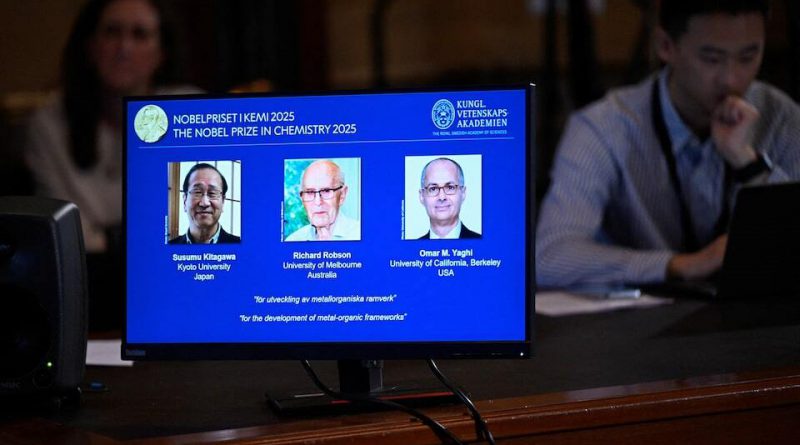Trio Wins 2025 Nobel Chemistry Prize for ‘Hermione’s Handbag’ Materials
Stockholm — In a celebration of innovation, collaboration, and scientific brilliance, the 2025 Nobel Prize in Chemistry has been awarded to Susumu Kitagawa, Richard Robson, and Omar M. Yaghi for their groundbreaking work in developing metal-organic frameworks (MOFs) — remarkable materials with enormous potential to address some of humanity’s most pressing challenges, from climate change to freshwater scarcity.
The three scientists, representing Japan, Australia, and the United States, have made a collective impact on the global scientific community through their visionary research.
Their discovery has led to the creation of molecular structures capable of storing gases, capturing carbon dioxide, and even extracting water from dry desert air.
According to the Royal Swedish Academy of Sciences, these MOFs are extraordinary for their massive surface area relative to size — a single cube the size of a sugar lump can contain as much inner surface area as a football field. This property allows the materials to act as “sponges” for gases, enabling efficient storage and filtration.
As Nobel Committee member Olof Ramstrom colorfully described, these materials are “almost like Hermione’s handbag in Harry Potter — small on the outside but vast on the inside.”
Beyond their scientific intrigue, MOFs are being recognized for their practical applications. They can capture harmful emissions, separate toxic chemicals, and filter out pollutants like PFAS — known as “forever chemicals” — from water.
They may also play a key role in renewable energy development by helping to capture and store gases essential for clean energy systems.
Professor Susumu Kitagawa of Kyoto University expressed deep gratitude during the Nobel announcement, saying his dream has always been to “capture air and separate it — whether CO₂, oxygen, or water — and convert it into useful materials using renewable energy.”
His statement reflects the forward-thinking nature of this discovery, blending chemistry with sustainability and environmental stewardship.
Richard Robson, a British-born scientist who later moved to Australia, and Omar M. Yaghi, a Jordanian-American researcher at the University of California, Berkeley, have each made crucial contributions to advancing the field.
Yaghi, whose parents were Palestinian refugees in Amman, moved to the U.S. as a teenager and went on to pioneer the concept of crystal-like MOF structures that are both durable and highly porous. His innovation became the foundation for an entirely new branch of materials chemistry.
The Royal Swedish Academy emphasized that these discoveries have paved the way for chemists around the world to create tens of thousands of different MOFs, many of which could contribute to solving global issues — from clean energy to environmental preservation.
This year’s Chemistry Nobel marks the third prize of the 2025 Nobel season, following awards in medicine and physics, with literature expected to be announced next.
Since its inception in 1901, the Nobel Prize has stood as a symbol of excellence and progress, celebrating human ingenuity and the pursuit of knowledge.
By honoring Kitagawa, Robson, and Yaghi, the Academy not only recognizes their scientific excellence but also highlights the power of international cooperation in science.
Their achievements are a shining example of how creativity, persistence, and collaboration across borders can yield solutions to some of the world’s toughest problems — offering hope for a cleaner, more sustainable, and innovative future.



